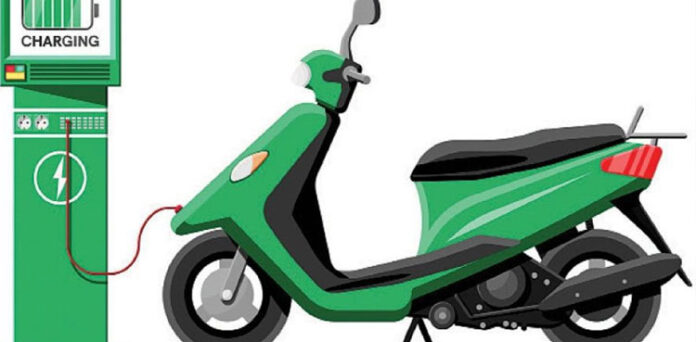Punjab E-Bike Best Scheme 2024: E-bike Distribution Date
The wait is over for Punjabi students! The provincial government has unveiled July 10, 2024 as the distribution date for the much-anticipated e-bikes. This initiative, aimed at providing 20,000 electric bikes to students, promotes eco-friendly commuting and affordability.
E-Bikes distribution date unveiled by Punjab Govt
The wait is over for students in Punjab! The provincial government has finally unveiled the distribution date for its much-anticipated CM Punjab E-Bike Best Scheme program. Starting July 10, 2024, 20,000 electric bikes will be distributed to students across Punjab. This initiative, aimed at promoting eco-friendly transportation and easing student commutes, offers a win-win situation. Students benefit from affordable access to CM Punjab E-Bike Best Scheme, while the environment gains from reduced emissions. This announcement marks a significant step towards a greener future for Punjab and its youth. With a focus on sustainability and empowering youth, the e-bike program marks a significant step towards a greener future for Punjab.
Addressing Transportation Challenges and Environmental Concerns
Punjab’s recent announcement regarding the distribution of electric bikes (e-bikes) under the Chief Minister Youth Program is a welcome step towards tackling two of the province’s most pressing issues: transportation challenges and environmental concerns. This initiative, aimed at providing 20,000 CM Punjab E-Bike Best Scheme to students, has the potential to significantly improve student mobility while promoting a cleaner and healthier environment.
Traffic Congestion and Air Pollution: A Growing Crisis
Major cities in Punjab, like Lahore and Rawalpindi, grapple with a daily struggle against ever-increasing traffic congestion. The sheer volume of vehicles on the roads leads to longer commute times, decreased productivity, and frustration for commuters. Furthermore, the exhaust fumes emitted by these vehicles contribute significantly to air pollution, posing a major health hazard for residents. Respiratory illnesses, especially amongst children and the elderly, are on the rise due to poor air quality.
E-bikes: A Sustainable Solution
The introduction of e-bikes offers a promising solution to these interconnected problems. CM Punjab E-Bike Best Scheme provide a convenient and eco-friendly alternative to traditional fuel-powered vehicles. They are powered by electric motors, producing zero tailpipe emissions. This significantly reduces air pollution levels, leading to cleaner air and a healthier environment for everyone.
Promoting Green Commute Habits
The program specifically targets students, fostering a culture of sustainable transportation from a young age. By offering a cost-effective and reliable mode of transport, e-bikes encourage students to leave their cars or motorbikes at home and opt for a greener commute. This not only reduces traffic congestion but also creates a ripple effect, promoting awareness and adoption of Punjab E-Bike Scheme amongst the wider population.
Aligning with Global Trends
The CM Punjab E-Bike Best Scheme initiative aligns with the growing global movement towards electric mobility. Many countries are actively promoting the use of electric vehicles to reduce dependence on fossil fuels and combat climate change. By embracing CM Punjab E-Bike Best Scheme, Punjab positions itself at the forefront of this global shift, demonstrating its commitment to environmental sustainability.
Challenges and Considerations
While the program presents significant benefits, some challenges need to be addressed. Establishing a robust charging infrastructure across Punjab is crucial for the successful implementation of the program. The government needs to create a network of charging stations at educational institutions, public spaces, and strategic locations to ensure students have access to charging points throughout the day.
Promoting Safe Riding Practices
Ensuring the safety of student riders is paramount. Safety awareness campaigns and training programs should be implemented to equip students with the knowledge and skills necessary to navigate roads safely. This includes instruction on traffic rules, responsible riding practices, and the importance of using safety gear like helmets and reflective clothing.

Empowering Students through Accessibility
The CM Punjab E-Bike Best Scheme recent announcement regarding the distribution of electric bikes (e-bikes) has generated a wave of excitement amongst students. This initiative, titled “Empowering Students through Accessibility,” aims to bridge the gap between transportation needs and financial limitations. By providing 20,000 e-bikes to students across the province, the program seeks to promote eco-friendly transportation and improve accessibility to educational institutions.
A Sustainable Solution for Daily Commutes
The program tackles pressing issues like traffic congestion and air pollution plaguing Punjab’s major cities. E-bikes offer a convenient and cost-effective alternative to traditional fuel-powered vehicles. They produce zero tailpipe emissions, contributing to cleaner air and a healthier environment. This initiative aligns with the global shift towards electric mobility, paving the way for a more sustainable future for Punjab.
Making Education Accessible
Affordability plays a key role in the program’s design. Through a collaboration with manufacturers, the government offers a manageable down payment of Rs. 10,000 followed by affordable monthly installments. This subsidized program makes e-bikes accessible to a wider student population, particularly those from less privileged backgrounds. The program specifically aims to bridge the gap in access for students residing in remote areas, enabling them to reach their educational institutions more efficiently.
Transparency and Fair Distribution
The distribution process, commencing on July 10, 2024, prioritizes transparency and inclusivity. A quota-based system ensures fair distribution across the province. Urban areas will allocate an equal number of e-bikes to both male and female students, promoting gender equality in transportation choices. Rural areas will prioritize male students (70/30 quota) due to existing socio-economic structures affecting female mobility. However, this disparity acknowledges the current reality while paving the way for a more balanced distribution in the future.
Boosting the Economy and Creating Jobs
The CM Punjab E-Bike Best Scheme program holds the potential to create a ripple effect on Punjab’s economy. The massive procurement of 20,000 e-bikes will boost the domestic electric vehicle industry. This increased demand will likely attract new manufacturers and investments, leading to increased production, job creation, and technological advancements in the sector. Furthermore, the program will create a demand for servicing and maintenance infrastructure, fostering the growth of related businesses.
Challenges and Considerations for Success
For the program to flourish, key challenges need to be addressed. A robust charging infrastructure is crucial to ensure the widespread adoption of e-bikes. The government should collaborate with the private sector to create a network of charging stations at educational institutions, public spaces, and strategic locations. Additionally, promoting safe riding practices is essential. Awareness campaigns and training programs can equip students with the knowledge and skills to navigate roads safely and minimize accidents.
A Step Towards a Brighter Future
The Punjab government’s e-bike initiative is a promising step towards a more sustainable and equitable transportation system. It empowers students by providing them with affordable access to e-bikes, promoting environmental consciousness, and stimulating economic growth. The success of this program hinges on a well-developed charging infrastructure, education on safe riding practices, and continuous improvement in the program’s design and implementation. As the program unfolds, its impact on student mobility, air quality, and the development of Punjab’s electric vehicle industry will be closely monitored.

Distribution Details and Transparency
The Punjab government’s e-bike initiative has garnered significant interest, particularly with the recently announced distribution date. This program, aimed at providing 20,000 electric bikes (e-bikes) to students, prioritizes transparency and a fair quota-based system. Let’s delve deeper into the distribution details, exploring how the government plans to ensure a smooth and equitable process.
A Clear Timeline for Distribution
The distribution of e-bikes will commence on July 10, 2024. This clear timeline allows students to plan and prepare for acquiring their e-bikes. The government is likely to establish dedicated distribution centers across the province to facilitate a streamlined process. Information regarding center locations, registration procedures, and required documentation should be readily available through official government channels, websites, and potentially a dedicated mobile application.
Quota System for Equitable Distribution
The program employs a quota-based system to ensure fair distribution across Punjab’s diverse regions. In urban areas, the focus is on gender inclusivity. A 50/50 quota for male and female students guarantees equal access to e-bikes. This approach acknowledges the increasing participation of women in education and promotes gender equality in transportation choices.
Considerations for Rural Areas
Rural areas will follow a 70/30 quota, prioritizing male students. This decision acknowledges socio-economic realities in rural settings. Traditional societal structures may limit female mobility in some regions. However, the 30% quota serves as a starting point, aiming to gradually increase female participation in future iterations of the program.
Transparency Through Online Platforms
The government should establish an online platform to enhance transparency throughout the distribution process. This platform could provide real-time updates on the number of e-bikes available in each region, the application status for students, and any potential delays or changes. Additionally, a dedicated helpline with trained personnel can address student queries and provide support.
Verification and Application Process
To ensure efficient distribution and prevent misuse, a thorough verification process is crucial. Students will likely need to provide valid student identification cards, proof of residence, and potentially income documents demonstrating eligibility for the program’s subsidized pricing. The application process should be streamlined and accessible, potentially allowing online applications alongside in-person options at distribution centers.
Combating Potential Malpractices
Measures to prevent fraudulent applications or black market resale of e-bikes are essential. Unique identification numbers linked to each e-bike and student can deter unauthorized use. Additionally, clear communication regarding penalties for misuse can act as a deterrent.
The Role of Educational Institutions
Educational institutions can play a crucial role in ensuring a smooth distribution process. Collaborating with the government, institutions can facilitate the verification of student applications and potentially serve as distribution points for enrolled students. This approach leverages the existing infrastructure and network within the education system.
Building Trust Through Transparency
A transparent distribution process is essential for building trust with students and the public. By providing clear timelines, detailed information on quotas and procedures, and readily accessible support channels, the government can foster a sense of fairness and inclusivity. Additionally, regular updates on the distribution progress will keep stakeholders informed and engaged.

Economic Benefits and Job Creation
The Punjab government’s recent announcement regarding the distribution of 20,000 electric bikes (e-bikes) to students goes beyond just offering a convenient mode of transportation. This initiative, under the Chief Minister Youth Program, holds the potential to create a significant economic ripple effect, fostering job creation and growth within the province’s electric vehicle (EV) industry.
Boosting Domestic Manufacturing
The bulk purchase of 20,000 e-bikes presents a golden opportunity for domestic EV manufacturers. This large-scale demand acts as a catalyst, encouraging existing manufacturers to expand production capacities and potentially attracting new players to the market. Increased competition can lead to advancements in e-bike technology, improved designs suited for local needs, and potentially lower prices for consumers in the long run.
This government initiative serves as a strong signal of confidence in the domestic EV industry. Investors are likely to be drawn to this emerging market, potentially leading to increased funding for research and development (R&D) activities. This can fuel innovation and accelerate the development of more efficient, affordable, and user-friendly e-bikes.
A Surge in Employment Opportunities
The burgeoning EV industry will create a demand for skilled labor across various sectors. Manufacturing plants will require additional workers for assembly, quality control, and maintenance. This can lead to job creation for engineers, technicians, mechanics, and production line workers. Additionally, the need for a robust charging infrastructure will open up opportunities for electricians, civil engineers, and construction workers.
The program’s impact extends beyond direct employment. As the e-bike user base grows, a demand for after-sales service and maintenance will emerge. This will foster the growth of service centers, creating job opportunities for technicians and entrepreneurs venturing into this sector. The rise in e-bike usage might also stimulate ancillary businesses like spare parts suppliers and battery repair services, further contributing to job creation.
Spillover Effects on the Broader Economy
The e-bike program’s economic benefits extend beyond the EV industry itself. The increased production of e-bikes will have a positive impact on various allied sectors like metal fabrication, battery technology, and electronics. This can lead to increased demand for raw materials and components, stimulating growth in these industries. Additionally, the program will likely lead to a rise in disposable incomes for students who save money on transportation costs. This increased purchasing power can translate to higher consumer spending, benefiting various businesses within the province.
Challenges and Considerations
While the economic potential of the e-bike program is undeniable, certain challenges need to be addressed to maximize its impact. Developing a skilled workforce is crucial for the sustainable growth of the EV industry. The government can collaborate with educational institutions to introduce specialized courses in EV technology, preparing students for the jobs of tomorrow. Additionally, providing training programs for existing mechanics and technicians can help bridge the skill gap.
A Sustainable Future for Punjab
The Punjab government’s e-bike program not only empowers students with eco-friendly transportation but also presents a significant economic opportunity. By fostering the growth of the domestic EV industry and creating new job opportunities, this initiative contributes to Punjab’s economic development on a sustainable path. The program’s success hinges on creating a skilled workforce, fostering innovation within the industry, and ensuring the responsible disposal of e-bikes at the end of their lifespan. As Punjab embraces electric mobility, the e-bike program can serve as a model for other provinces in Pakistan, paving the way for a greener and more prosperous future.

Challenges and Considerations
The Punjab government’s recent announcement regarding the distribution of electric bikes (e-bikes) on July 10, 2024, has generated a buzz of excitement amongst students. This initiative, under the Chief Minister Youth Program, aims to distribute 20,000 e-bikes, offering a sustainable and affordable transportation option. However, while the program promises numerous benefits, navigating potential challenges will determine its long-term success.
Combating Pollution and Congestion:
Traffic congestion and air pollution are major concerns in Punjab’s urban centers. To address these issues, the e-bike program tackles these issues head-on by promoting a cleaner mode of transport. Furthermore, e-bikes offer a convenient alternative to traditional fuel-powered vehicles, producing zero tailpipe emissions. This aligns with the global shift towards electric mobility, potentially contributing to a significant reduction in air pollution and a healthier environment.
Accessibility for All Students:
Affordability plays a crucial role in ensuring the program reaches a wider student population. Through collaboration with manufacturers, the government facilitates acquiring e-bikes with a manageable down payment and affordable monthly installments. This subsidized program aims to bridge the gap between transportation needs and financial limitations, offering economic empowerment especially for students from underprivileged backgrounds. Additionally, a separate scheme for high achievers incentivizes academic excellence.
Transparent Distribution System:
The Punjab government has emphasized a transparent and quota-based system for e-bike distribution. As a result, urban areas will see an equal distribution between male and female students, promoting gender inclusivity. Meanwhile, in rural areas, a 70/30 quota prioritizes male students, acknowledging the existing societal structures that often limit female mobility.
This approach seeks a balance, while also striving to encourage greater female participation in the future.
Boosting the Economy and Creating Jobs:
The e-bike program holds the potential to create a positive economic ripple effect. The bulk procurement of 20,000 e-bikes can significantly boost the domestic electric vehicle industry. This could attract new manufacturers and investments, leading to increased production, job creation, and technological advancements in the sector. Furthermore, the program will create a demand for service and maintenance infrastructure, fostering the growth of related businesses.
Challenges to be Addressed:
The success of the program hinges on effectively addressing certain challenges. In order to achieve this, establishing a robust charging infrastructure across Punjab is crucial. Moreover, collaboration with the private sector is essential to create a network of charging stations at educational institutions, public spaces, and strategic locations on major routes.
Additionally, prioritizing safety through awareness campaigns and training programs is paramount. Equipping students with the knowledge and skills for safe riding will minimize potential accidents.
A Sustainable Future on Two Wheels:
The Punjab government’s e-bike initiative is a promising step towards a more sustainable and equitable transportation system. It empowers students with affordable access to environmentally friendly transportation, promoting environmental consciousness and economic growth. However, ensuring the program’s long-term success requires careful consideration of several factors. This includes developing a sustainable revenue model beyond the initial distribution phase, as well as conducting environmental impact assessments for battery disposal. Moreover, the program will monitor its effectiveness in promoting gender equality and economic mobility.
Beyond the Initial Buzz:
As the program rolls out, its impact on student mobility, air quality, and the overall development of Punjab’s e-bike industry will be closely monitored. The success of this initiative lies in its ability to address the existing challenges head-on and continuously improve its design and implementation. As a result, the e-bike program has the potential to revolutionize student transportation, paving the way for a greener future in Punjab.
The Punjab government’s recent announcement regarding the distribution of electric bikes (e-bikes) has sent a wave of excitement through the province’s young population. Furthermore, this initiative, nestled within the Chief Minister Youth Program, promises to provide 20,000 e-bikes to students, fostering eco-friendly transportation and easing their daily commute. As a result, this in-depth exploration delves into the program’s core aspects, dissecting its objectives, distribution specifics, and the potential impact it holds for Punjab’s future.
Combating Pollution and Congestion with a Sustainable Solution
Traffic congestion and air pollution have become major challenges plaguing Punjab’s major cities. In response to these issues, the e-bike program encourages students to embrace a sustainable mode of transport. Moreover, e-bikes offer a convenient and cost-effective alternative to traditional gasoline-powered vehicles. Unlike their fuel-guzzling counterparts, e-bikes produce zero tailpipe emissions, contributing significantly to cleaner air and a healthier environment. This initiative aligns with the global shift towards electric mobility, paving the way for a more sustainable future for Punjab.
Empowering Students Through Affordability
Accessibility is a key focus of the program, aiming to make e-bikes a viable option for a wider student base. In order to achieve this goal, the government facilitates student acquisition of e-bikes with a manageable down payment of Rs. 25,000 followed by affordable monthly installments.
This subsidized program bridges the gap between transportation needs and financial limitations, particularly for students from less privileged backgrounds. Additionally, a separate scheme exists for high achievers, further incentivizing academic excellence.
Transparent Distribution and Reaching All Corners of Punjab
The e-bike distribution process commences on July 10, 2024, with a transparent and quota-based system ensuring fair distribution across the province. Furthermore, urban areas will benefit from an equal quota allocation for male and female students, promoting gender inclusivity. Additionally, recognizing the existing socio-economic landscape in rural areas, a 70/30 quota prioritizes male students. This approach acknowledges current realities while striving for a more balanced distribution in the future.
Boosting the Economy and Creating New Opportunities
The e-bike program extends its positive impact beyond the realm of transportation. The procurement of 20,000 e-bikes is expected to significantly boost the domestic electric vehicle industry. This surge in demand might attract new manufacturers and investments, leading to increased production, job creation, and advancements in electric vehicle technology within Punjab. Furthermore, the program will nurture the growth of service and maintenance infrastructure, fostering the development of new businesses in the electric mobility sector.
Challenges and the Road Ahead
While the program presents undeniable benefits, it’s crucial to address certain challenges to ensure its long-term success. Establishing a robust charging infrastructure across Punjab is paramount for the widespread adoption of e-bikes. Therefore, collaboration with the private sector can expedite the creation of a network of charging stations strategically located at educational institutions, public spaces, and high-traffic areas.
Additionally, promoting safe riding practices through awareness campaigns and training programs is essential. Equipping students with the knowledge and skills to navigate roads safely will minimize potential accidents and promote responsible e-bike usage.
A Greener Future on Two Wheels
The Punjab government’s e-bike initiative is a commendable step towards a more sustainable and equitable transportation system. Furthermore, by providing affordable access to e-bikes, the program fosters environmental consciousness, empowers students with a reliable mode of transport, and stimulates economic growth. However, the program’s success hinges on a well-developed charging infrastructure, robust safety education, and continuous improvement in its design and implementation.
As the program unfolds, it will be fascinating to witness its impact on student mobility, air quality, and the overall trajectory of Punjab’s electric vehicle industry. This initiative has the potential to position Punjab as a leader in sustainable transportation solutions, setting a precedent for a cleaner and brighter future.





